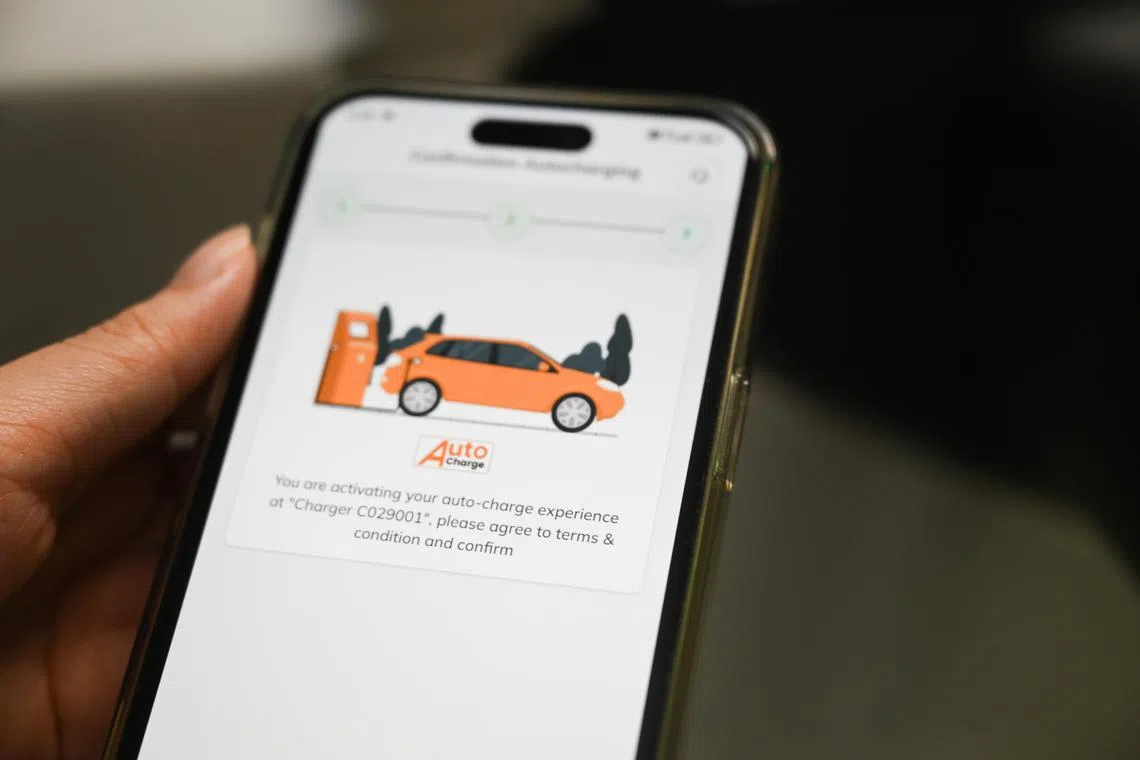City Energy launches Singapore’s first app-free EV charging network
Sign up now: Get ST's newsletters delivered to your inbox

Developed in-house based on an open standard called AutoCharge, the app-free charging system is available at five locations in Singapore.
ST PHOTO: SHINTARO TAY
SINGAPORE - Energy supplier City Energy has launched Singapore’s first charging network that lets drivers juice their electric vehicles (EVs) without the hassle of logging into an app or the need for reliable mobile reception.
Developed in-house based on an open standard called AutoCharge, the app-free charging system is available at five locations in Singapore: Pullman Singapore Hill Street, Klimt Cairnhill, Komo Shoppes, North Gaia and North Park Residences. City Energy currently has 124 charge points islandwide.
“Our aim has always been simple – to make EV charging feel as natural and convenient as charging your phone,” said Mr Perry Ong, chief executive of City Energy.
City Energy intends to double the size of its EV charging network, called Go by City Energy, in Singapore to 248 charge points by 2028. One-fifth of these charging points will be AutoCharge-enabled by 2028.
It has also partnered JomCharge – a network owned by Malaysian EV charging operator EV Connection – to allow Singapore EV drivers who are registered with AutoCharge on the City Energy Go app to charge their cars when they are driving in Malaysia.
There are over 200 AutoCharge-enabled JomCharge EV charging points in Malaysian destinations such as Johor, Kuala Lumpur, Penang, Melaka and Sarawak.
The launch of AutoCharge, which is also widely used in the US and Europe, is part of City Energy’s $100 million investment to install more charging points in private residential and commercial sites by end-2030.
AutoCharge aims to solve the ongoing problem of EV drivers having to deal with multiple apps for charging at stations operated by different firms, as well as poor mobile data connectivity in underground carparks. Loading a charging app can be difficult without reliable connection.
Unlike drivers of internal combustion engine vehicles, EV drivers must log in to an EV charging operator’s app and scan a QR code on the charging station to initiate the charging process. Fees are billed to the customer’s card registered in the app. As every EV charging network has its own app to manage such transactions, drivers often end up having to use multiple apps.
“With AutoCharge, EV drivers only need to register their vehicle once on our app (City Energy Go). After that, they can simply plug in and power up without touching their phones – no apps, no QR codes, no hassle,” said Mr Ong.
Existing Go customers may request a vehicle identification number from City Energy, which is needed for a first-time registration in the app.
After the first-time registration, users simply have to plug the DC (direct current) connector into their vehicle to charge, and pull the connector out to stop charging. Any family member can charge the vehicle as the process does not require an app.

EV drivers need to register their vehicle only once on the City Energy Go app. After that, they can plug in their vehicles without needing to use their phones.
ST PHOTO: SHINTARO TAY
Drivers will be informed when their car is fully charged through push notifications from the City Energy Go app.
EV brands compatible with AutoCharge include BYD, Tesla, Aion, MG and Chery. Go by City Energy is working with more carmakers to expand AutoCharge compatibility.
Go by City Energy’s AutoCharge feature is available only on its DC fast chargers.



